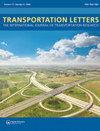针对拥挤不堪的地铁线路,联合优化地铁旅行预订和车厢容量分配
IF 3.3
3区 工程技术
Q2 TRANSPORTATION
Transportation Letters-The International Journal of Transportation Research
Pub Date : 2025-02-07
DOI:10.1080/19427867.2024.2339632
引用次数: 0
摘要
在一些特大城市,地铁线路在高峰时段经常出现严重拥堵,带来严重的运营风险。为缓解乘客延误和拥挤状况,本研究 ...本文章由计算机程序翻译,如有差异,请以英文原文为准。
Joint optimization of metro travel reservation and compartment capacity allocation for an overcrowded metro line
In some mega cities, metro lines often experience severe congestion during peak hours, posing serious operational risks. To alleviate passenger delay and address overcrowded conditions, this study proposes a novel model for metro travel reservation and carriage reserved capacity. The model comprises three components: off-station queuing restrictions, dynamic loading constraints, and carriage reserved capacity constraints. A particle swarm optimization algorithm is applied to allocate reservation quota by considering time-variant and location-dependent passenger demand and train supply. The paper applies the model to Nanjing Metro Line 3, using historical data to estimate passenger demand and compartment capacity, and evaluates its performance in four scenarios. The results demonstrate proposed approach efficiently obtains high-quality joint reservation plans, resulting in a notable reduction of approximately 20% in platform delay time and 50% in off-platform queuing time in suitable scenarios. The paper also discusses the implementation challenges and limitations, and provides recommendations for effective application.
求助全文
通过发布文献求助,成功后即可免费获取论文全文。
去求助
来源期刊

Transportation Letters-The International Journal of Transportation Research
TRANSPORTATION SCIENCE & TECHNOLOGY-
CiteScore
6.40
自引率
14.30%
发文量
79
审稿时长
>12 weeks
期刊介绍:
Transportation Letters: The International Journal of Transportation Research is a quarterly journal that publishes high-quality peer-reviewed and mini-review papers as well as technical notes and book reviews on the state-of-the-art in transportation research.
The focus of Transportation Letters is on analytical and empirical findings, methodological papers, and theoretical and conceptual insights across all areas of research. Review resource papers that merge descriptions of the state-of-the-art with innovative and new methodological, theoretical, and conceptual insights spanning all areas of transportation research are invited and of particular interest.
 求助内容:
求助内容: 应助结果提醒方式:
应助结果提醒方式:


